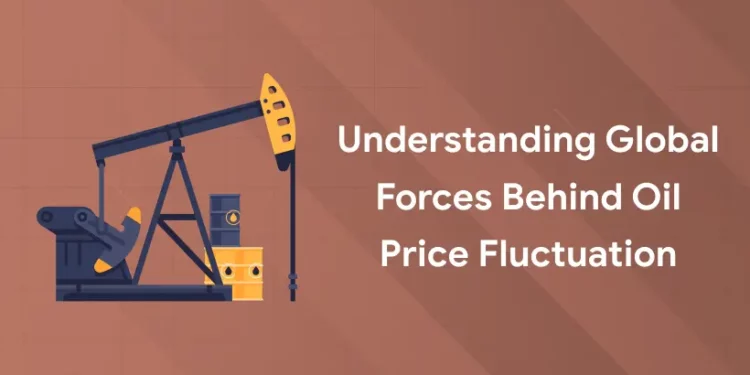Table of Contents
Since the world economy is a complex system, rising oil price could not have the same impact that conventional economic theory predicts. Though there are plenty of reasons to conclude that rising oil costs are contributing to a faltering economy, the truth is that oil prices affect the world economy far more than most economists realise.
Oil is the world’s primary energy source, accounting for 3% of total economic output. It becomes a very valuable commodity as a result. There is a relationship between its consumption and the state of the economy. The cost of other commodities is likewise influenced by the price of oil.
Get Certified! Get Confident! Join our Oil and Gas Course!
Supply and Demand Impact
The rules of supply and demand govern the price of oil, just like they do for any other commodity, stock, or bond. Prices decrease when supply is greater than demand, and the opposite is also true when demand is greater than supply.
A consistent supply of oil from OPEC combined with a decline in oil demand in China and Europe has been blamed for the sharp decline in oil prices in 2014.5. Oil prices fell precipitously as a result of the overabundance of supply. Drastic drops in the price of petrol and oil can also be brought on by financial crises, such as the Great Recession of 2008.
Although supply and demand have an impact on oil prices, the price of oil is mostly determined by oil futures. An oil futures contract is a legally binding contract that grants the buyer the right to purchase a barrel of oil at a certain price at a later date. The buyer and seller of the oil must finalise the transaction by the date specified in the contract.
Geopolitical Influences in Oil Price Fluctuation
1: What is the primary purpose of a refinery in the oil and gas industry?
Oil prices may be impacted by geopolitical shocks due to decreased economic activity or increased risks to the supply of commodities. There are two basic ways in which geopolitical risk can impact the price of commodities and energy. First, increased geopolitical tensions depress demand globally by raising uncertainty about the prospects for the economy, which has a negative impact on investment and consumption and may even disrupt global trade. When these factors come together, they cause the world economy to decline, which in turn lowers the demand for and price of oil globally.
This is sometimes referred to as the economic activity channel. Furthermore, the risk channel pertains to the possibility that financial markets have factored in increased threats to the future supply of oil in addition to the present geopolitical shock. This drives up Brent prices and raises the financial value of holding oil contracts, sometimes referred to as the convenience yield. The direction in which these two channels drive the oil markets differ, and it is up for empirical inquiry which channel wins out. One of the other confusing variables is the possibility that oil producers will choose to modify their output in order to stabilise prices.
An international geopolitical shock typically drives down the price of oil. By accounting for the response of oil producers and controlling for global activity and the financial cycle, a VAR model can be used to determine how oil prices, as measured by the Brent variety, respond to geopolitical shocks on a global scale.
Regions Susceptible to Tensions
Many oil-producing nations, especially those in the Middle East, are frequently linked to geopolitical crises. This region includes Kuwait, Iraq, Iran, Saudi Arabia, and Libya. But the uncertainty around the supply of oil has been increased by other nations, which has affected prices. For instance, sanctions have been placed on Russia because of its dubious involvement in world politics.
Russia and Ukraine Tensions
Geopolitical tensions, which began in late 2021 and worsened in early 2022, caused a 35% increase in the price of West Texas Intermediate (WTI).9. Russian officials issued a warning in mid-December 2021, stating that NATO forces should leave Eastern Europe and that Ukraine should not join the alliance. Energy markets erupted as a result of the United States and NATO’s refusal.10
Russia started conducting military operations in Ukraine in early 2022, focussing on targets within the nation as well as the rebel areas in the east. Consequently, on December 15, 2021, WTI oil prices surged above $100, while Brent crude surged to over $105 during intraday trade in early 2022.
Global Economic Performance
China, Europe, and the United States are the primary oil demand generators. These three use about 45 million barrels of crude oil a day combined. As a result, the strength of local economies and the state of the world economy can have a big impact on oil prices.
For example, the 2008 financial crisis caused industry to slow down, which reduced the need for oil. In five months, the price of Brent Crude fell by more than $100 in the absence of a comparable reduction in the supply of oil.
Yet the price of oil will begin to rise again when business revives, which it frequently does. For example, three years after the 2008 crash, oil prices had recovered to above $100 per barrel. Up until August 2014, oil prices stayed above $85 after that. At the moment, 98 million barrels of crude oil are consumed daily worldwide. There is conjecture on the sustainability of the current high oil demand, partly because of the advancements in renewable energy sources.
Market Speculation
Oil prices are set on futures markets, therefore market speculation about future occurrences may have an impact on oil prices. For example, the need for oil may decline significantly if China decided to construct additional nuclear power facilities.
On the flip side, more worldwide fracking might lead to higher oil supply and more speculation in the oil market. However, the growth and development of the fracking sector as a further supply of oil is dubious because several governments throughout the world, including those in France, Germany, and Ireland, have outlawed the practice.
Get Certified! Get Confident! Join our Oil and Gas Course!
Influence of Currency Fluctuation
While a significant number of studies examine the relationship between the US dollar (USD) exchange rate and crude oil prices, the relationship between exchange rates and international oil prices is extensively researched in the literature (for a recent literature review, please refer to Beckmann et al., 2020).1. Previous works have explained the two-way causality between these variables by pointing to various transmission channels and possible co-movement of variables.
However, given the significant swings in global oil prices during the 2008–2009 Global Financial Crisis (GFC), the co-movement becomes less evident right away (Beckmann et al., 2020). Furthermore, it’s critical to distinguish between co-movements and the underlying causal relationship between exchange rates and oil prices, as Kilian and Zhou (2019) emphasise. Thus, many types of time-series nonlinear techniques are used in recent empirical studies in order to comprehend the relationship between these variables.
Alternative Energy Sources
There may be a decrease in the world’s dependency on oil if people become more aware of the advantages of renewable energy sources like solar and wind. Along with promises from several governments to stop producing new petrol and diesel vehicles in the coming years, electric automobiles also bear some of the blame.
Oil prices may decline as a result, even if supply would stay high. To maintain prices at a profit, OPEC and other oil-producing regions of the world may, nevertheless, also cut back on their production in the event of declining demand.
Conclusion:
One of the world’s most volatile markets is undoubtedly the oil one. Its price is strongly influenced by politics and the choices made by governments and world leaders. This is particularly true at this time, when the industry’s future is so uncertain.
Professionals in the field can receive thorough training by enrolling in Entri’s oil and gas course. It addresses important subjects like drilling, exploration, and production methods. Modules on safety procedures and environmental legislation are also included in the training. It equips students with useful insights and top-notch education to meet the challenges of the changing energy world. Anyone wishing to progress in their oil and gas career should take advantage of this training.
Frequently Asked Questions
What are the factors influencing the price of oil?
Similar to other commodities, the market’s supply and demand determine the price of oil. Another significant consideration is the price of producing and extracting oil.
Why are oil prices so volatile?
The high degree of “inelasticity” or low responsiveness of both supply and demand to short-term price fluctuations is intrinsic to the volatility of oil prices.
What was the primary cause of the decline in oil prices?
Many reasons have contributed to the recent drop in oil prices, including the unwinding of some geopolitical threats, a dramatic shift in OPEC policy, a decline in global demand, many years of unexpectedly high unconventional oil output, and an increase in the value of the US dollar.










